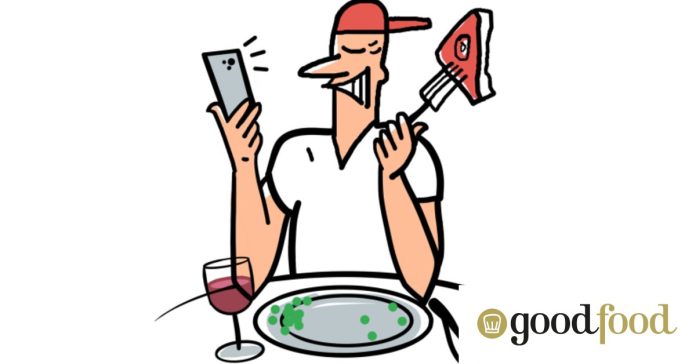[ad_1]
Elbows on table? Don’t worry about it. The time is right to lighten up a bit at restaurants. Just try not to be late.

In our increasingly casual dining-out scene, where restaurants have done away with tablecloths and are dumping canisters full of utensils in the centre of the table, is it time to overhaul traditional rules of etiquette inspired by the European court?
According to a recent British poll conducted by pizza restaurant chain Prezzo, elbows are creeping their way back onto the dinner table, as Gen Z diners believe that restrictions such as these are no longer relevant.

However, when I quiz British etiquette expert and social media sensation William Hanson (@williamhansonetiquette) about it, he says it’s not that The Youth don’t believe in the value of etiquette. It’s just that what is valued has shifted.
“Gen Z and younger generations are interested in manners and etiquette, despite what some people think,” he says.
“It should be noted that there is evidence, going way back to the Norman Conquest, of older generations bemoaning the fact that younger generations are ruder. I think that it’s not necessarily that they are ruder; it’s just that they behave in a different way, propelling change in manners and etiquette.”
Dining etiquette in the 21st Century is less about knowing which fork to use when. “Gen Z today are much more aware of inclusive manners and inclusive language and making sure that different people who have different lived experiences to them feel just as included as those with more conventional experiences,” says Hanson.
“Gen Z today are much more aware of inclusive manners and inclusive language.”
UK etiquette expert William Hanson
Perhaps, then, the line is blurring between good etiquette and good manners. The former is a set of rules that changes over time and can vary widely between cultures. The latter is more about courtesy and consideration for others. You can have good manners without necessarily understanding the etiquette of a situation. But you can’t have good etiquette without good manners.
There is always a place for good manners as a diner – and more broadly. But as for etiquette, maybe it’s time we loosened up. Herewith, I offer some guiding protocols – for every gen.

The new rules of modern dining etiquette
- Do aim to arrive on time. If you’re running late, let your dining companions know.
- Don’t worry so much if your companions are tardy. I say this as someone who is always late but worth the wait. I like to think that lateness is a sign of optimism, not rudeness.
- Do send a photo or PDF of the menu to stragglers while you wait, so they can percolate while running late.
- Do treat waitstaff courteously. They’re your hosts for the evening, and you’re in their house.
- Do leave bags and jackets on a chair or under the table – not on the table.
- Do consider leaving your phone in said bag or jacket, too. If you’re afflicted with nomophobia (that’s a fear of being without your phone!) leave it screen-down, and on airplane mode. That way, you can take pictures if you’re that way inclined, then pop it away again.
- Do discuss splitting the bill at the top of the meal to make the end more streamlined. Old-school etiquette dictates that whoever initiates the meal pays the bill, but that is far less common nowadays.
- Do tip, if you can afford it. 10 per cent is standard, 15 per cent is generous.
- Do use your cutlery from outside in – but don’t have a cow if someone else doesn’t.
- Do fill up others’ water glasses when you fill your own.
- Do feel free to keep your cutlery and plates if you’d prefer to keep mopping up bits and bobs.
- Don’t season a dish before you’ve tasted it.
- Don’t start eating cold dishes until everyone has theirs – but hot dishes can be hoed into as soon as they drop.
- Don’t dig your cutlery into communal plates – unless it’s family.

- Don’t reach over your companions to grab something. Ask the person closest to it to pass it – unless it’s family!
- Don’t let the dregs stay on a share plate because you’re worried you’ve taken too much. Offer it to your companions first, then declare it your own.
- Do try to avoid elbows on the table, but don’t let it take up too much of your bandwidth. This rule is now more about functional digestion – because sitting like that makes you slouch, and kinks your kishkes.
- Do eat with your hands when the opportunity arises. Most cultures prefer the right hand as the moppy hand. I must say, there’s nothing more pleasurable to me than retrieving salad leaf by leaf with my fingers – just be sure to pop it onto your plate from the communal one first.
- And finally, do lighten up, in general. Dining should be a place of comfort and frivolity, not one-upmanship and status-signalling. I’m reminded of when the late Queen Elizabeth II chose to hug then-first lady Michelle Obama back, rather than recoiling from a touch that was “not protocol”. In doing so, she exhibited more class and grace than if she’d stuck to the done thing. Yas Kween.
The best recipes from Australia’s leading chefs straight to your inbox.
From our partners
[ad_2]
Source link


